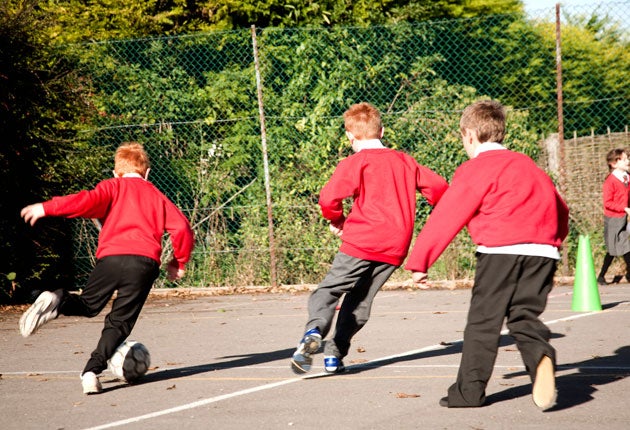Cheating on school playing fields witnessed by more than half of children

Your support helps us to tell the story
From reproductive rights to climate change to Big Tech, The Independent is on the ground when the story is developing. Whether it's investigating the financials of Elon Musk's pro-Trump PAC or producing our latest documentary, 'The A Word', which shines a light on the American women fighting for reproductive rights, we know how important it is to parse out the facts from the messaging.
At such a critical moment in US history, we need reporters on the ground. Your donation allows us to keep sending journalists to speak to both sides of the story.
The Independent is trusted by Americans across the entire political spectrum. And unlike many other quality news outlets, we choose not to lock Americans out of our reporting and analysis with paywalls. We believe quality journalism should be available to everyone, paid for by those who can afford it.
Your support makes all the difference.School playing fields are a hotbed of rule-breaking where more than half of children witness unfair play in every game they play. The most common forms of cheating are faking injuries, elbowing opponents, arguing with the umpire and head butting.
Schoolchildren in Leeds are most likely to see unfair play a "lot of times in a game" – perhaps a throwback to days when Leeds United had the reputation of the hardest team in the Football League under Don Revie's managership. Research looking at just over 1,000 eight- to 16-year-olds was carried out by the Marylebone Cricket Club and the Cricket Foundation, a charity dedicated to educate children through cricket, which are conducting a campaign to encourage fair play in schools.
The survey revealed that children aged 14 were the most likely to be bad sports, with almost two-thirds of teenagers of this age regularly seeing cheating in games. The picture in primary schools was brighter, with only 37 per cent of eight- to 11-year-olds witnessing foul play in every game.
Twice as many youngsters at schools that had not been visited by the "fair play" campaign witnessed regular cheating, compared to those who had. The MCC and Cricket Foundation's scheme plans to visit thousands of schools this year.
Most children said they would not be swayed by professional sports cheats to ape them. The large majority (72 per cent) believed unfair play was "cheating" and 33 per cent believed those who indulged in it were "stupid".
Wasim Khan, the chief executive of the Cricket Foundation, said: "Fair play is something that should be taught at an early age. Independent research by Loughborough University found that cricket can help provide young people with life skills such as how to win and to lose graciously."
In a second survey, more than 1,000 parents were asked what was the least sporting moment in history. Top of the sport "hall of shame" was Mike Tyson biting Evander Holyfield's ear in a 1997 heavyweight boxing title fight.
Second was Thierry Henry setting up a French goal with a double handball in the game that sent them to the World Cup final this year at the expense of the Republic of Ireland. In third place was Diego Maradona's punching the ball into the back of England's net in the 1986 World Cup quarter-final tie – since known as the "Hand of God" goal.
Other bad sportsmanship moments to linger in parents' memories included the Spanish Paralympic basketball team being stripped of their 2000 gold medals when it was discovered none of them had been tested for handicaps.
Join our commenting forum
Join thought-provoking conversations, follow other Independent readers and see their replies
Comments